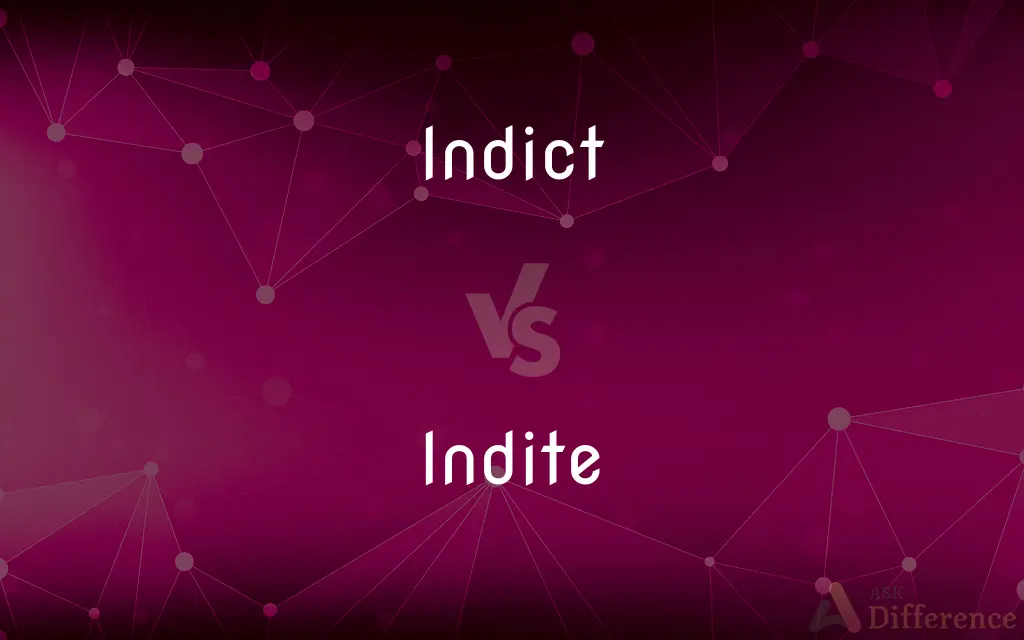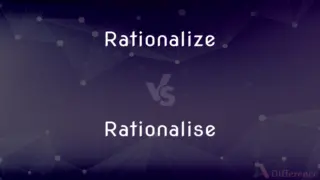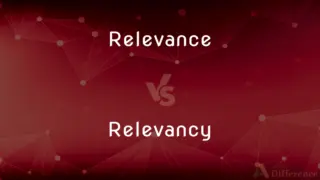Indict vs. Indite — What's the Difference?
Edited by Tayyaba Rehman — By Maham Liaqat — Updated on April 7, 2024
Indict means to formally accuse of a crime, whereas indite is to compose or write.

Difference Between Indict and Indite
Table of Contents
ADVERTISEMENT
Key Differences
Indict is a legal term used to formally accuse someone of a crime, typically by a grand jury. It is the process by which charges are formally brought against an individual, leading potentially to a trial. On the other hand, indite is an archaic term that refers to the act of writing or composing, especially in a literary context. It suggests the creation of written works, such as poetry or prose, highlighting the distinction between legal accusation and literary creation.
While indict involves the judicial system and is a precursor to a legal process, indite revolves around the realm of literature and creativity. An indictment can lead to serious legal consequences, including trials and potential penalties, whereas to indite is to engage in the artistic process of writing, devoid of legal implications. This contrast underscores the different spheres in which the two terms operate: law versus literature.
Indictment is a critical step in the criminal justice process, signaling that there is sufficient evidence to charge someone with a crime and proceed to trial. Conversely, inditing is associated with the creative process, reflecting an individual's expression through written words. The former is a formal and procedural action with potential life-altering consequences, while the latter is a personal or professional act of creation, often bringing satisfaction or artistic fulfillment.
The action to indict is carried out by legal authorities or bodies, such as grand juries in the United States, underscoring its formal and institutional nature. In contrast, to indite something is an action that can be taken by anyone with the inclination to write or compose, reflecting its accessibility and the personal nature of writing. This difference highlights how indictments are the purview of the legal system, while inditing is a more universal activity tied to literary endeavors.
Indictments are public and can have a significant impact on the accused's reputation, legal standing, and future, emphasizing the gravity and external implications of the term. Inditing, however, is often a private endeavor, with the impact and reception of the written work depending on the audience's subjective interpretation and appreciation. This final point contrasts the external, societal implications of indictment with the more subjective and personal nature of inditing.
ADVERTISEMENT
Comparison Chart
Definition
To formally accuse someone of a crime
To write or compose text
Context
Legal
Literary
Outcome
Legal proceedings
Creation of literary work
Process
Carried out by legal authorities
Can be done by anyone who writes
Implications
Legal consequences, public impact
Personal satisfaction, artistic expression
Compare with Definitions
Indict
Accusation by a judicial body.
After the investigation, they were indicted for their involvement in the scheme.
Indite
To put thoughts into written form.
He indited his memoirs over the course of a decade.
Indict
Bring formal charges in a court of law.
The grand jury decided to indict the mayor for corruption.
Indite
Engage in the act of writing.
She spends her mornings inditing articles for the magazine.
Indict
Initiate legal action against an individual.
She was indicted for embezzlement last year.
Indite
Create written works.
The author indited several novels that became bestsellers.
Indict
Legal process preceding a trial.
The indictment led to a high-profile trial that captured public attention.
Indite
Compose or write.
He indited a beautiful poem about nature.
Indict
Formally accuse of a crime.
The businessman was indicted on charges of fraud.
Indite
Literary creation.
The playwright indited a new drama that explores complex themes.
Indict
(Law) To charge (a party) by indictment.
Indite
Indite is an extremely rare indium-iron sulfide mineral, found in Siberia. Its chemical formula is FeIn2S4.
Indict
To accuse of wrongdoing or criticize severely
"[He] managed to indict the country's smug, liberal establishment whose lip service throttled the struggle for civil rights" (Bob Spitz).
Indite
Write; compose
He indites the wondrous tale of Our Lord
Indict
To accuse of wrongdoing; charge.
A book that indicts modern values
Indite
To write; compose.
Indict
(legal) To make a formal accusation or indictment for a crime against (a party) by the findings of a jury, especially a grand jury.
His former manager was indicted for fraud
Indite
To set down in writing.
Indict
To write; to compose; to dictate; to indite.
Indite
(Obsolete) To dictate.
Indict
To appoint publicly or by authority; to proclaim or announce.
I am told shall have no Lent indicted this year.
Indite
(transitive) To physically make letters and words on a writing surface; to inscribe.
Indict
To charge with a crime, in due form of law, by the finding or presentment of a grand jury; to bring an indictment against; as, to indict a man for arson. It is the peculiar province of a grand jury to indict, as it is of a house of representatives to impeach.
Indite
(transitive) To write, especially a literary or artistic work; to compose.
Indict
Accuse formally of a crime
Indite
To dictate; to prompt.
Indite
(obsolete) To invite or ask.
Indite
(obsolete) To indict; to accuse; to censure.
Indite
(mineral) An extremely rare indium-iron sulfide mineral.
Indite
To compose; to write; to be author of; to dictate; to prompt.
My heart is inditing a good matter.
Could a common grief have indited such expressions?
Hear how learned Greece her useful rules indites.
Indite
To invite or ask.
She will indite him to some supper.
Indite
To indict; to accuse; to censure.
Indite
To compose; to write, as a poem.
Wounded I sing, tormented I indite.
Indite
Produce a literary work;
She composed a poem
He wrote four novels
Common Curiosities
Can anyone indite?
Yes, anyone who engages in writing or composing text can indite, regardless of professional or amateur status.
Are indictments public?
Yes, indictments are public records and can affect the accused's reputation and legal standing.
What does it mean to indict someone?
To indict someone means to formally accuse them of a crime, usually by a grand jury.
Is inditing still a common term?
No, inditing is considered an archaic term and is rarely used in modern English.
What is the purpose of inditing?
The purpose of inditing is to create written works, ranging from personal expression to literary art.
How does an indictment affect the legal process?
An indictment formally initiates the legal process, leading to further legal actions such as trials.
Can indite be used in non-literary contexts?
Traditionally, indite is used primarily in literary contexts, though it may metaphorically apply to the act of creating in other fields.
What happens after someone is indicted?
After indictment, the accused may face a trial to determine their guilt or innocence.
What are the consequences of being indicted?
Consequences can include legal battles, potential penalties, and societal repercussions.
Can a person be indicted for any crime?
While indictments are common for serious crimes, the applicability depends on legal standards and evidence.
Does inditing require special skills?
Inditing requires writing skills and creativity, but it does not necessitate formal training.
What legal body can indict?
In the United States, a grand jury is typically responsible for indictments.
Is it necessary to have a lawyer to indite?
No, inditing does not require legal assistance as it pertains to writing, not legal processes.
Can an indictment be challenged?
Yes, the accused can challenge an indictment through legal proceedings and defenses.
Is there a digital platform for inditing?
While indite is not commonly used today, digital platforms for writing and publishing serve the modern equivalent of this activity.
Share Your Discovery

Previous Comparison
Rationalize vs. Rationalise
Next Comparison
Relevance vs. RelevancyAuthor Spotlight
Written by
Maham LiaqatEdited by
Tayyaba RehmanTayyaba Rehman is a distinguished writer, currently serving as a primary contributor to askdifference.com. As a researcher in semantics and etymology, Tayyaba's passion for the complexity of languages and their distinctions has found a perfect home on the platform. Tayyaba delves into the intricacies of language, distinguishing between commonly confused words and phrases, thereby providing clarity for readers worldwide.















































